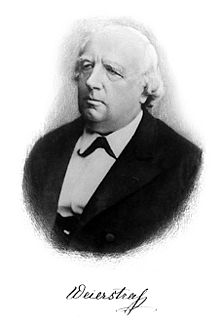Karl Weierstrass
Appearance

Karl Theodor Wilhelm Weierstrass (October 31, 1815 – February 19, 1897) was a German mathematician who is often cited as the "father of modern analysis".
| This article about a mathematician is a stub. You can help out with Wikiquote by expanding it! |
Quotes
[edit]- ... es ist wahr, ein Mathematiker, der nicht etwas Poet ist, wird nimmer ein vollkommener Mathematiker sein.
- ... it is true that a mathematician who is not somewhat of a poet, will never be a perfect mathematician.
- Letter to Sofia Kovalevskaya, August 27, 1883, as shared by Gösta Mittag-Leffler at the 2nd International Congress for Mathematicians in Paris. Compte rendu du deuxième Congrès international des mathematiciens tenu à Paris du 6 au 12 août 1900, Gauthier-Villars (Paris), 1902, page 149.
- ... it is true that a mathematician who is not somewhat of a poet, will never be a perfect mathematician.
Quotes about Weierstrass
[edit]- Objections... inspired Kronecker and others to attack Weierstrass' "sequential" definition of irrationals. Nevertheless, right or wrong, Weierstrass and his school made the theory work. The most useful results they obtained have not yet been questioned, at least on the ground of their great utility in mathematical analysis and its implications, by any competent judge in his right mind. This does not mean that objections cannot be well taken: it merely calls attention to the fact that in mathematics, as in everything else, this earth is not yet to be confused with the Kingdom of Heaven, that perfection is a chimaera, and that, in the words of Crelle, we can only hope for closer and closer approximations to mathematical truth—whatever that may be, if anything—precisely as in the Weierstrassian theory of convergent sequences of rationals defining irrationals.
- Eric Temple Bell, Men of Mathematics: The Lives and Achievements of the Great Mathematicians from Zeno to Poincaré (1937)
- The arithmetization of mathematics... which began with Weierstrass... had for its object the separation of purely mathematical concepts, such as number and correspondence and aggregate, from intuitional ideas, which mathematics had acquired from long association with geometry and mechanics.
These latter, in the opinion of the formalists, are so firmly entrenched in mathematical thought that in spite of the most careful circumspection in the choice of words, the meaning concealed behind these words, may influence our reasoning. For the trouble with human words is that they possess content, whereas the purpose of mathematics is to construct pure thought.
But how can we avoid the use of human language? The... symbol. Only by using a symbolic language not yet usurped by those vague ideas of space, time, continuity which have their origin in intuition and tend to obscure pure reason—only thus may we hope to build mathematics on the solid foundation of logic.- Tobias Dantzig, Number: The Language of Science (1930).
- [Up to that time] one would have said that a continuous function is essentially capable of being represented by a curve, and that a curve has always a tangent. Such reasoning has no mathematical value whatever; it is founded on intuition, or rather on a visible representation. But such representation is crude and misleading. We think we can figure to ourselves a curve without thickness; but we only figure a stroke of small thickness. In like manner we see the tangent as a straight band of small thickness, and when we say that it touches the curve, we wish merely to say that these two bands coincide without crossing. If that is what we call a curve and a tangent, it is clear that every curve has a tangent; but this has nothing to do with the theory of functions. We see to what error we are led by a foolish confidence in what we take to be visual evidence. By the discovery of this striking example Weierstrass has accordingly given us a useful reminder, and has taught us better to appreciate the faultless and purely arithmetical methods with which he more than any one has enriched our science.
- Henri Poincaré, "L'oeuvre Mathématique de Weierstrass," Acta Mathematica Vol.22 as quoted by John Theodore Merz, A History of European Thought in the Nineteenth Century Vol.2 (1903)


